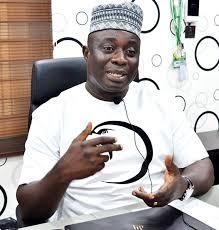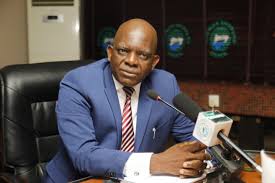Mr. Yinka Bakare is the President of National Association of Air freight Forwarders and Consolidators (NAFFAC). In this interview with Oluyinka Onigbinde, he discusses issues bothering the Council for Regulation of Freight Forwarding in Nigeria.

We’re already in December; I like to start by asking for your appraisal of the maritime industry this year. What’s your assessment?
I think firstly, we appreciate the government of President Bola Ahmed Tinubu for creating a Marine and Blue Economy ministry. You would recall that in the last administration, one of the things we even asked for was for the president to have a special adviser on maritime under the Ministry of Transport. But I think the president saw beyond that and created the Ministry of Marine and Blue Economy, which is a very big industry. From everything that is happening, we can see that the minister is really taking the job seriously; like taking the oceanography institutes back to the Ministry of Marine and Blue Economy, including the fishery department, and other relevant agencies. It shows they know what it takes to have that ministry running, which is a good one for the marine and blue economy in general. We are also looking at all the other agencies we have under that. Being that it’s a new ministry, I think it would be too early for us to do an appraisal yet. But we can already see significant efforts, such as the maritime and transport policy that is currently in development and still in the pipeline. Additionally, there’s a bill concerning the Nigerian Shippers’ Council which is the Nigerian Shipping and Port Economic Regulatory Agency Bill currently being discussed at the National Assembly. While a lot remains pending, the foundational steps being taken indicate a strong commitment, and I believe this groundwork will yield positive results in the near future. So far, I would say they have tried their best as far as establishing and stabilizing the ministry is concerned.
When we look at some of the policies taken so far by this current minister, would you say they have had any significant impact on the freight forwarding industry?
Like I said earlier, I think it’s too early to tell. Regarding freight forwarding, we are looking at the agency that regulates the profession under the Ministry of Marine and Blue Economy. Even that agency has some issues, both internal and external agitations that need to be addressed. These are inherited problems that have accumulated over time and require careful and deliberate resolutions. For now, we need to give it time and observe the trajectory of these policies and their implementations. However, it’s clear that resolving these longstanding issues could have a transformative effect on the freight forwarding sector in the long run. So, while it might seem premature to make definitive statements, the early signs are promising, and time will reveal the true impact of these policies. To the best of his ability, I think he has tried.
As a freight forwarder, you work closely with the Nigeria Customs Service. What is your appraisal of the Comptroller General’s performance?
Let me start by saying congratulations to the service first; for meeting their targets, and secondly, for having a core professional at the helm of affairs. This has been lacking for over eight years. You can see that when he came in, he has created a lot of avenues such as the Customs Consultative Forum and a lot of interventions under his leadership. It shows that the CG, coming from a Public Relations background has handled many complaints and has used that experience to boost the service. However, while Customs celebrates meeting their revenue target, I can tell you as a freight forwarder, they didn’t achieve this alone without the freight forwarders. Freight forwarders contribute significantly to that success, assisting in meeting or surpassing those targets. In fact, it’s a collaborative effort that highlights the interdependence between the Customs Service and stakeholders like freight forwarders, whose role is often under-appreciated but vital. We have always demanded that freight forwarders deserve some percentage of Customs revenue.
Are you suggesting freight forwarders should receive a percentage of the revenue based on what you generate?
Yes, we’ve been advocating for that. It’s our right and something we’re entitled to. The contributions of freight forwarders are integral to achieving these targets, and it’s only fair that this effort is recognized and rewarded appropriately. This isn’t just about financial compensation but about fostering a system where all contributors are acknowledged and incentivized to maintain high performance levels. By doing so, the sector can achieve even greater efficiency and collaboration.
Is this push coming from individual freight forwarders or associations?
As time goes on, we will see more collective action from associations and groupz of freight forwarders. There is a growing awareness of the need for a unified voice in the industry, and efforts are already underway to consolidate these voices into a coherent and effective advocacy platform. A lot is coming in this regard, and I believe we will witness significant progress in how freight forwarders engage with both the Customs Service and other stakeholders.
Talking about associations, there seems to be some discord among the freight forwarding associations, particularly regarding the appointment of the Registrar for CRFFN. Some are calling for his removal, while others support the appointment. Can you speak on this?
The case is in court, so it’s not something I can discuss in detail on the pages of the newspaper. What we’ve asked for is a mere interpretation of a section of the Act. We have made it clear that we are not against any individual; it’s just about clarifying what the law says. We’ll wait for the court’s decision. There are two things. It is either you are wrong or you are right.
Are you not worried that you are not on the same page?
No, I don’t think so. It’s not about being on different pages; it’s about seeking clarity. It has absolutely nothing against anybody or nothing in favour of anybody or something. Resolving this matter is critical; not just for the sake of legal correctness, but for ensuring that the operations of CRFFN and its leadership align with the expectations and needs of its members. Once this is resolved, I believe it will pave the way for greater unity and collaboration among the associations.
Some have also argued that outside of the appointment of the registrar, the council is seen as a professional body, just like the federal government declared last year. Do you think the government has the right to appoint a Registrar for a professional body?
Like I said, the case is in court. I don’t want to discuss it with the media. We are looking up to the court to explain things that we don’t understand. That is just what we ask for.
Asides the appointment, some are calling for more accredited associations under the council. Currently we have five and some are calling for more. Do you support this push?
Well, I think that is the detail of the Governing Council of CRFFN when it is in place. So, it is left for those who are on the Governing Council to determine that and act on it.
Some have argued that the governing council of CRFFN is too large compared to that of other agencies. Do you think there’s a need to reduce the number of members of the CRFFN Governing Council?
I will say this. If you have followed me for some time, I have made it clear that although we are not the biggest governing council, we are one of the biggest. In terms of that, I would say that looking at it as an agency of government; I think we are having too many numbers. For instance, the Ministry of Education has just five or six representatives, the Nigeria Port Authority does not have anybody from the Ministry of Education as part of their board, but they still have their trainings school. So, you don’t need somebody from the Ministry of Education, you have somebody from NIIT, you have somebody representing three universities that offer that. I don’t understand because when you look at the Ministry of Education; you can see from NITT, you can see that somebody from the Ministry of Transport and NITT, you realize that in total we are having five from them. The Ministry of Transport is third, which is now the Ministry of Marine and Blue Economy. You have another five, somebody from the Ministry of Marine and Blue Economy, somebody from NPA, somebody from Shippers’ Council, one person from Nigerian Railway, so we have another five or so. The Ministry of Transport itself is represented in the governing board and we also have Customs. When we look at all these, it makes the council overly large. What we are saying is that the Ministry of Transport can bring just one person who will give direction if there is a need for us to have. CRFFN isn’t represented on the boards of agencies like NPA, NIMASA, Shippers’ Council and the National Inland Waterways Authority (NIWA), so why should those agencies have multiple representatives on CRFFN’s board? If we have just one person from the Ministry of Education and one person from the Ministry of Transport on the CRFFN governing board, you will realize that we would have reduced about 10 persons to two. If you remove 10 from 32, you will realize that the number will be reduced drastically. That is why we are seeking clarity on some grey areas of the Act. Reducing the numbers would streamline operations and make the council more effective. A leaner council would not only enhance decision-making, but also ensure that every member’s voice carries more weight, leading to more dynamic and responsive governance. This restructuring is necessary for the long-term efficiency and sustainability of the council’s operations.















